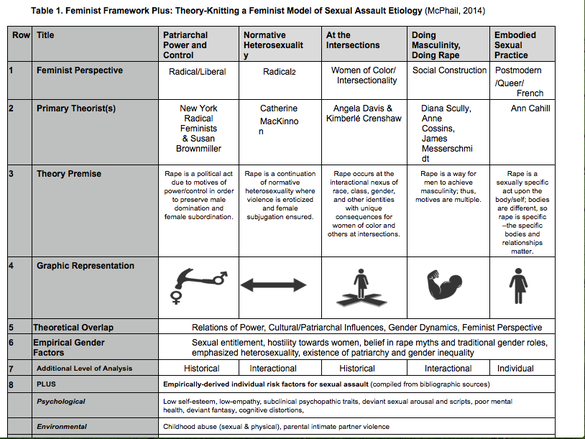Since the early 1970's radical and liberal feminists have theorized that rape is motivated by power and control not sex. This was a provocative theory after earlier theories saw women as male property and thus rape was an economic loss for the man who owned her. Then in the 1950's rape was medicalized to see rapists as mentally disturbed men with uncontrollable lust rather than criminals and women were viewed as precipitating their own rapes.
So the radical/liberal feminist theory that moved the motives of rape away from individuals and focused on how the patriarchy maintained power and control over women using rape as a weapon was a game-changer.
However, we are in the 21st century now and the feminist theory of rape is stuck in the 20th century. It is hard to believe that any one complex act, such as rape, could have a single motivation, such as power/control. A study by UT researchers Meston and Buss found that there were hundreds of motives for consensual sex, so surely there must be as many for nonconsensual sex.
It is hard to say rape is not about sex when many rape survivors suffer difficulties having consensual sex after the assault.
It is difficult to say rape is about violence but not sex because that infers that a physical assault is the same as a sexual assault and rape survivors would not agree.
If we say rape is not about sex, then why are so many survivors slut-shamed after the assault in a way they would not be if they were physically assaulted or if they were carjacked?
Radical feminist believed that if we said it was not about sex, then the sex lives of rape survivors would not be scrutinized and women would not be blamed for the assault. That strategy has not worked out too well.
So we need to look honestly at the etiology of rape because the radical/liberal theory of rape does not account for many different types of rape and therefore lacks explanatory power. A more complex theory is needed. Theory is important since it informs our practice, education, and policy.
Beverly McPhail has developed the Feminist Framework Plus to better account for the etiology of sexual assault. Her paper is in press in the journal Trauma, Violence, and Abuse. Below is a table that outlines her model from an earlier version of the work. In sum, rape has multiple motivations including power and control and sexual gratification. If we combine numerous feminist theories into one framework through a process of theory-knitting, we can better account for the complexity of rape and work to end it.
Obtain the journal article in the Trauma, Violence, and Abuse journal here:
http://tva.sagepub.com/content/early/recent

